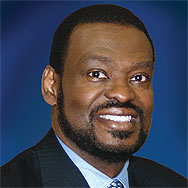
I have been amazed by a new collaboration between former political
rivals in all of our urban, minority communities.
The largely white religious right is
literally becoming a melting pot of diversity as far as this marriage
issue is concerned. Huge numbers of blacks and Hispanics of faith are
starting to feel that there is a “not so subtle” media attack on
the nation’s most fundamental institutions. They realize that many
movies and TV sitcoms have gone out of their way to express support
of so-called “gay rights.”
They marveled at the number of celebrities that have jumped on the
bandwagon for same-sex marriage. Two weeks ago 8, a play about
Prop 8 produced by Rob Reiner, trotted out Hollywood’s
finest—including Brad Pitt, George Clooney, among several openly
gay actors and actresses. The entertainers read selected testimonies
of traditional marriage which have never been released to the public.
The point of the play was simply to ridicule traditional marriage
supporters and “expose the bigotry” of the traditional point of
view.
All of this media attention has been coordinated and timed with
legislative battles in New York, Maryland and Washington state. The
800-pound gorilla in the room is that the Supreme Court will likely
rule on the constitutionality of referendums or votes on maintaining
the definition of marriage. Even the though the Supreme Court should
be above politics, the court will likely attempt to gauge the
aggregate public opinion about same-sex marriage.
In Maryland, the home of several of my lead churches, black clergy
voices were instrumental in blocking the same-sex marriage initiative
last year—so much so that Lesbian, Gay, Transgendered and Bisexual
(LGBT) activists lobbying in Maryland specifically targeted blacks
with a celebrity-studded marketing blitz. The opposition campaign
featured videos of black actors such as Michael Kenneth Williams (of
television’s The Wire, set in Maryland) and Baltimore native
Mo’nique winking at the camera and extolling the virtues of the gay
community. These PR efforts were synchronized with the strong-armed
tactics of Gov. Martin O’Malley (D).
There is a huge amendment campaign going on in Maryland right
now—to develop their version of proposition 8. As I have already
stated, the national media campaign is now coming to roost in
Maryland. Liberal talking heads project that blacks like me should
identify with gay people because they are fighting the same battle
for civil rights that we did. The overwhelming majority of black
Americans find this argument both offensive and ridiculous.
In fact, not long ago, Jonathon Capehart (openly gay writer for
The Washington Post and frequent commentator on MSNBC)
received a tweet that challenged his interpretation of current events
and history. The tweet read: “Still can’t believe u think the
choice of being gay is congruent to the struggle of blacks. Ain’t
never seen no gay plantations!”
Although the tweet succinctly captures how the vast majority of
blacks feel about this comparison, Capehart’s answers to the tweet
refused to address the two main concerns expressed by the writer.
First, the simple fact is that gay Americans have never been
rounded up and shackled into centuries of forced labor. They have
never been branded, owned or sold with the full permission of the
government. Further, in every state in the nation, gay Americans can
live as they choose; what traditional marriage advocates object to is
their crusade to redefine age-old institution for the rest of us.
The attempt of homosexual activists—of any race—to hijack the
moral authority that black Americans won through their blood, sweat,
tears and prayers is both dishonest and outrageous.
Secondly, Capehart went on to dismiss the tweet’s assertion that
the black experience and the gay experience in America are not
comparable because the individual refers to homosexuality as a
choice.
Let me explain.
First of all, I must point out that someone could theoretically
believe that homosexuality is an inborn trait and still not believe
that the historic suffering of gays compares to that of blacks. Human
suffering is nearly impossible to quantify, but I have a feeling that
the homosexual lobby would have difficulty coming up with numbers to
match the estimated 8 million blacks who suffered through the Middle
Passage (more than 1 million of whom are believed to have perished at
sea) or the millions born into bondage in the centuries that
followed.
Next, whether one defines homosexuality by the presence of
same-sex attraction or the choice of same-sex partners is really a
matter of semantics. Laws cannot regulate feelings; they can only
regulate behavior. What Capehart really wants when he asks the rest
of us to redefine marriage in the name of “equality” and
“dignity” is our approval of homosexuality.
Simply put, redefining marriage to include homosexual couples
forces the rest of us to say that in the eyes of the law, homosexual
behavior is morally equal to heterosexual behavior. They believe this
is self-evident, but not all of us agree.
The five states that will pursue constitutional amendments
defining marriage as a union between one man and one woman will
likely influence the fate of the institution of marriage nationally.
I am praying for the family and friends of folks from these states.
May you speak your worldview with passion and clarity. I also pray
that you will support the cause with your dollars and volunteer
service.
Bishop Harry R. Jackson Jr. is the senior
pastor of Hope Christian Church, a 3,000-member congregation in the
Washington, D.C., area. He is also the guest editor of the
January-February 2012 issue of Ministry Today about social
transformation.











































